London-Irish voices from our great Diaspora 1851
These days we hear a great deal about the Irish Diaspora. But all too often this means the life stories of those who did well in other parts of the world; the mass of emigrants become in a sense an amorphous cloud of exiled poverty. Now and again though we catch the voices of individuals.
The interviews Henry Mayhew (one of the founders of Punch) made on the streets with London poor and working people are a monument of social inquiry – the like is unknown here.
From his pages some Irish voices speak out, and they remind us that when we speak of hard times, they were once for many far harder. Mr Mayhew calculated their sale, at the time he wrote, at nearly fifteen and a half million oranges annually.
The orange trade was almost entirely in the hands of the Irish and a poor Irishwoman, neither squalid in appearance nor ragged in dress, though looking pinched and wretched, gave Mayhew the following story. Her history was one common to her class.
The orange street seller
“I was brought over here, sir, when I was a girl, but my father and mother died two or three years after. I was in service then, and very good service I continued in as a maid-of-all-work, and very kind people I met; yes, indeed, though I was Irish and a Catholic, and they was English Protistants.
“I saved a little money there, and got married. My husband’s a labourer; and when he’s in full worruk he can earn 12s. or 14s. a week, for he’s a good hand and harrud-worruking man, and we do middlin’ thin.
“He’s out of worruk now, and I’m forced to thry and sill a few oranges to keep a bit of life in us, and my husband minds the childer. Bad as I do, I can do 1d. or 2d. a day profit betther than him, poor man! for he’s tall and big, and people thinks, if he goes round with a few oranges, it’s just from idleniss; and the Lorrud above knows he’ll always worruk whin he can.
“He goes sometimes whin I’m harrud tired. One of us must stay with the childer, for the youngist is not three and the ildist not five.
“We don’t live, we starruve.
“We git a few ‘taties, and sometimes a plaice. Today I’ve not taken 3d. as yit, sir, and it’s past three. Oh, no, indeed and indeed, thin, I don’t make 9d. a day. We live accordingly, for there’s is. 3d. a week for rint.
“I have very little harrut to go into the public-houses to sill oranges, for they begins flying out about the Pope and Cardinal Wiseman, as if I had anything to do with it.
“And that’s another reason why I like my husband to stay at home, and me to go out, because he’s a hasty man, and might get into throuble. I don’t know what will become of us, if times don’t turn.”
A girl with a fruit stall
Mr Mayhew also took a statement from another young woman, of whose age it was not easy to form a conjecture, as she looked much older than the 18 or 19 years old she thought herself to be.
“I live by keepin’ this fruit stall. It’s a poor livin’ when I see how others live. Yes, in thruth, sir, but it’s thankful I am for to be able to live at all, at all; throth it is, in these sore times.
“My father and mother are both did. God be gracious to their sowls! They was evicted. The family of us was. The thatch of the bit o’ home was tuk off above our hids, and we were lift to the wide worruld — yis, indeed, sir, and in the open air too. The rint wasn’t paid and it couldn’t be paid, and so we had to face the wither.
“It was a sorrowful time. But God was good, and so was the neighbours. And when we saw the praste, he was a frind to us. And we came to this counthry, though I’d always heard it called a black counthry.
There’s a good many young payple I know is now sillin’ in the streets becase they was evicted in their own counthry”
“Sure, an’ there’s much in it to indhure. There’s goin’s on in it, sir, that the praste, God rewarrud him! Wouldn’t like to see. There’s bad ways. I won’t talk about thim, and I’m sure you are too much of a gintlemin to ask me; for if you know Father, that shows you are the best of gintlemin, sure.
“It was the eviction that brought us here. We walked all the long way to London. My parints died of the cholera, and I live with mysilf, but my aunt lodges me and sees to me. She sills in the sthreets too. I don’t make 7d. a day. I may make 6d. There’s a good many young payple I know is now sillin’ in the streets becase they was evicted in their own counthry. I suppose they had nowhere ilse to come to.
“I’m nivir out of a night. I sleep with my aunt and we keep to oursilves sure. I very sildom taste mate, but perhaps I do oftener than before we was evicted — Glory be to God.”
[Extracted from The Street Trader’s Lot – London 1851, being an account of the lives, miseries, joys and chequered activities of the London Street Sellers as recorded by their contemporary Henry Mayhew, edited by Stanley Rubinstein (London: The Sylvan Press, 1947). The illustration is an engraving based on a photograph, one of a series, by a Mr Beard, commissioned by Henry Mayhew.]


 Peter Costello
Peter Costello
